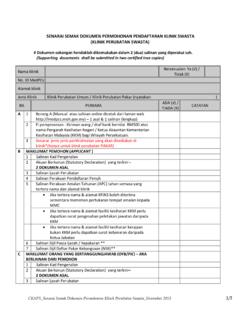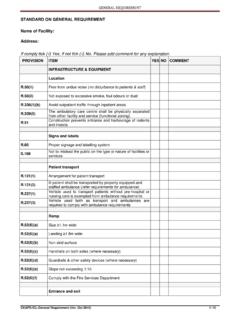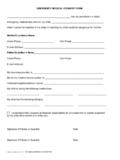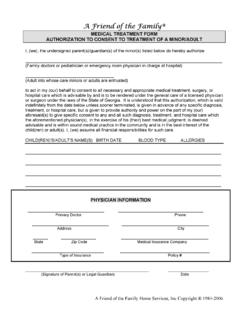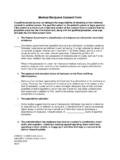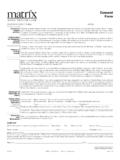Transcription of MMC Guideline CONSENT FOR TREATMENT OF …
1 MMC Guideline CONSENT FOR TREATMENT OF patients . BY registered medical PRACTITIONERS. 1. Definition In general terms, CONSENT is the voluntary acquiescence by a person to the proposal of another; the act or result of reaching an accord; a concurrence of minds;. actual willingness that an act or an infringement of an interest shall occur. CONSENT is an act of reason and deliberation. A person who possesses and exercises sufficient mental capacity to make an intelligent decision demonstrates CONSENT by performing an act recommended by another. CONSENT assumes a physical power to act and a reflective, determined, and unencumbered exertion of these powers. CONSENT refers to the provision of approval or assent, particularly and especially after thoughtful consideration. 2. Necessity For Obtaining CONSENT Generally, no procedure, examination, surgery or TREATMENT - may be undertaken on a patient without the CONSENT of the patient, if he or she is a competent person.
2 Such CONSENT may be expressed or implied and may be verbal or in writing. Obtaining a patient's CONSENT is an important component of good medical practice, and also carries specific legal requirements to do so. Except in an emergency where the need to save life is of paramount importance, the CONSENT of the patient must be obtained before the proposed procedure, examination, surgery, or TREATMENT - is undertaken. Failure to do so may result in disciplinary inquiry for transgression of ethical professional codes and/or legal action for assault and battery instituted against the medical practitioner . 3. Necessity To Warn patients About Material Risks Every patient as an individual has a choice whether or not to undergo a proposed procedure, surgery, examination or TREATMENT . A medical practitioner is obliged to disclose information to the patient and to warn the patient of material risks before taking CONSENT . Failure to obtain a patient's CONSENT or disclose material risks may be interpreted as a failure of the standard of care resulting in a disciplinary inquiry by the medical Council or may even be construed as a breach of duty of care and legal action instituted.
3 1. While a patient might CONSENT to a procedure after being informed in broad terms of the nature of the procedure, this CONSENT will not amount to an exercise of choice unless it is made on the basis of relevant information and advice. Relevant information includes disclosure of possible risks which the patient ought to know and/or should know. The medical practitioner must inform the patient, in a manner that the patient can understand, about the condition, investigation options, TREATMENT options, benefits, all material risks, possible adverse effects or complications, the residual effects, if any, and the likely result if TREATMENT is not undertaken, to enable the patient to make his own decision whether to undergo the proposed procedure, examination, surgery, or TREATMENT . 4. Explanatory Notes/Documents It is recommended that practitioners provide additional information on risks and adverse effects of any procedure in a written explanatory document which the patient (or next-of-kin or legal guardian) can read, request further explanation where necessary, understand and append a signature to that effect.
4 These Explanatory Notes will be considered an annexure to the main CONSENT form signed by the patient or next-of-kin or legal guardian. Where such explanatory notes or document are not available or not in standard use, the practitioner may note down the risks and adverse effects, as explained to the patient (or next of kin or legal guardian) in the patient's case notes and duly signed/initialled by him, with the date. 5. Circumstances in Which CONSENT May Not Be Required There are several exceptions to the rule that the CONSENT of a patient must be obtained before commencing any procedure, surgery, examination or TREATMENT , and they include the following: A medical emergency is defined as an injury or illness that is acute and poses an immediate risk to a person's life or long term health. CONSENT is not required in emergencies where immediate TREATMENT is necessary to save an adult person's life or to prevent serious injury to an adult person's immediate and long term health where the person is unable to CONSENT , subject to there being no unequivocal written direction by the patient to the contrary, or where there is no relative or any legal guardian available or contactable during the critical period to give CONSENT .
5 2. In such circumstances, a consensus of the primary surgeon/physician (who is managing the patient) and a second registered practitioner is obtained and the primary surgeon/physician signs a statement with the CONSENT form stating that the delay is likely to endanger the life of the patient. The second registered medical practitioner must co-sign the CONSENT form. Specific arrangements apply for the obtaining of CONSENT from a third party such as a parent or guardian of a child patient (see infra, paragraphs 21 et seq.). CONSENT of the patient may not be required for any TREATMENT that may be ordered by a court of law, for example, an order for the specific TREATMENT of a minor, or a patient on life-support. 6. patients Who Are Young Persons (Minors). The Laws of Malaysia Act 21: Age of Maturity Act 1971 states under Age of majority: The minority of all males and females shall cease and determine within Malaysia at the age of eighteen years and every such male and female attaining that age shall be of the age of majority.
6 Generally, whether a young person is sufficiently mature to provide a valid CONSENT to medical TREATMENT depends not only on his or her age but also on whether he or she has sufficient maturity and intelligence to understand the nature and implications of the proposed procedure, surgery, examination or TREATMENT . This must be decided on a case-by-case basis, and whatever decisions made must be in the best interest of the patient . Best Interest of the patient or child is a single decision made by the medical practitioner (s), for management of a patient who is in a situation of helplessness, the decision so made being the most appropriate and fair to that patient or child under the circumstances. It is important to note that for the purposes of the Regulations, a patient who is unmarried and below 18 years of age does not have the capacity to give valid CONSENT to any medical procedure or surgery. If a minor presents with an adult other than a parent, the attending medical practitioner should attempt to ascertain the adult's relationship to the child and whether the adult is the child's guardian.
7 - In instances where the attending medical practitioner is unable to adopt the above attempts in ascertaining the relationship of the accompanying adult to the child, he or she should defer the TREATMENT unless it is an emergency life-threatening situation, or follow the procedures as for a medical emergency. 3. Where the patient is an infant as defined under the Guardianship of Infants Act 1961, it would be prudent for the medical practitioner to consult or obtain the CONSENT of the infant's legal guardian. Under the Guardianship of Infants Act 1961, the guardian of the person of an infant shall have the custody of the infant, and shall be responsible for his support, health and education. The Law Reform (Marriage & Divorce) Act 1976 makes it clear that each parent has full responsibility for each of his/her children who is under 18 years of age. Parental responsibility is not affected by changes to relationships ( if the parents separate). Each parent has the responsibility for his/her child's welfare, unless there is an agreement or a Court has made an order to the contrary.
8 [3]. This means that the CONSENT of either parent to his/her child's medical TREATMENT is usually sufficient. There are two circumstances where the CONSENT of either parent may not be sufficient: i. Where no formal court orders have been made, and one parent consents and the other refuses. The best way of handling this situation is by counselling the parents and reaching agreement on what is in the child's best interests. ii. Where a Court of law has made an order to the contrary. In recognising the evolving capacity of the child, the United Nations Convention on the Rights of the Child (commonly abbreviated as the CRC, CROC, or UNCRC) as a human rights treaty setting out the civil, political, economic, social, health and cultural rights of children, defines a child as any human being under the age of eighteen, unless the age of majority is attained earlier under a state's own domestic legislation. 7. patients Who Are Incapable Of, or Impaired With, Decision-Making Ability Impairments to reasoning and judgment which may make it impossible for someone to give informed or valid CONSENT include such factors as basic intellectual or emotional immaturity, high levels of stress such as Post Traumatic Stress Disorder (PTSD) or as severe mental retardation, severe mental illness, intoxication, severe sleep deprivation, Alzheimer's disease, or being in a coma.
9 In such circumstances, and in an emergency to save life, the procedure as outlined for emergency TREATMENT or management should be followed. When there is a relative, next-of-kin or legal guardian is available, and the relationship well established or confirmed, the CONSENT may be obtained from such a person if an elective or non-emergency operation is necessary from a medical practitioner 's considered opinion. 4. Under the Mental Health Act 2001,[5] CONSENT is generally not required for conventional TREATMENT apart from surgery, electroconvulsive therapy or clinical trials for patients with mental disorder as defined by the said Act. In instances where CONSENT is required it must first be obtained from: i. The patient himself if he is capable of giving CONSENT as assessed by a psychiatrist; or ii. If the patient is incapable of giving CONSENT , from his guardian in the case of a minor or a relative in the case of an adult, guardian and relative as defined in the Mental Health Act.
10 Iii. Two psychiatrists, one of whom shall be the primary or attending psychiatrist, if the guardian or relative of the patient is unavailable or untraceable and when the patient himself is incapable of giving CONSENT . 8. Types of CONSENT In all instances or episodes of taking CONSENT , whenever possible conducted in privacy, it must be ensured that the patient (or next-of-kin or legal guardian) is fully aware of the objective and process of giving CONSENT , be comfortable and composed. a. Implied CONSENT is a form of CONSENT which is not expressly granted by a person, but rather inferred from a person's actions and the facts and circumstances of a particular situation (or, in some cases, by a person's silence or inaction). This may become an issue if there is any dissent or disagreement arising from the patient's interpretation of the practitioner 's actions or the outcome thereof. b. Expressed CONSENT may be in oral, nonverbal or written form and is clearly and unmistakably stated.



